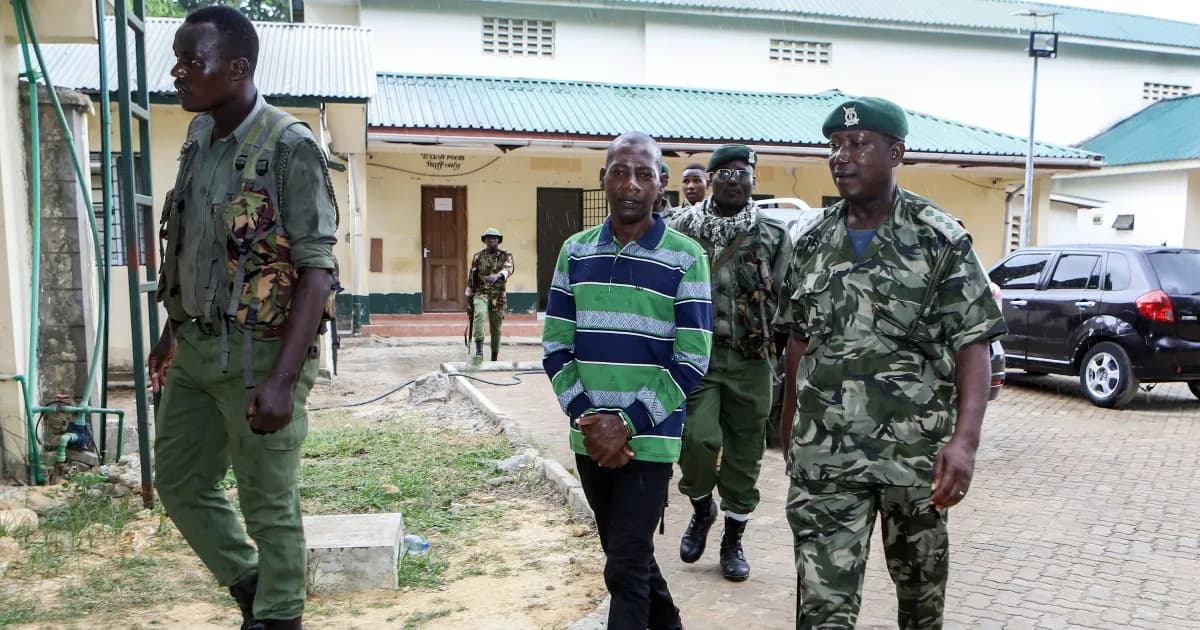We're loading the full news article for you. This includes the article content, images, author information, and related articles.
At the Mombasa High Court, protected witnesses testified that cult leader Paul Mackenzie ordered followers to starve to death, beginning with children, and used burials as "weddings" in the Shakahola Forest massacre.

Mombasa, Kenya – Harrowing testimony has emerged at the Mombasa High Court during the ongoing murder trial of preacher Paul Mackenzie and 29 co-accused, accused of orchestrating one of Kenya’s worst mass killings in recent history. Protected witnesses have begun recounting how the Good News International Church, founded by Mackenzie, allegedly turned into a death cult that encouraged followers to starve themselves and their children to death in the now infamous Shakahola Forest massacre.
On Monday, the court heard from a 19-year-old protected witness, identified only as P.P., who gave a chilling account of life inside Mackenzie’s church.
According to P.P., he and his parents were forced to convert to Christianity before being allowed to join the cult. Once inside, he said Mackenzie preached that salvation could only be achieved through starving to death.
The witness alleged that children were the first to be targeted. Families were instructed to deny their children food until they died, a process Mackenzie reportedly described as a sacred act.
In a disturbing revelation, P.P. told the court that the deaths of children were ritualised and rebranded within the cult’s doctrine. Burials were referred to as “weddings”, with deceased children said to have “wedded Jesus.”
This language, the witness explained, was used to normalise death and discourage mourning, reinforcing Mackenzie’s grip on his followers.
Beyond witnessing the starvation of children, P.P. admitted he was compelled to take part in the burials. He recounted digging shallow graves in the forest, covering the bodies, and carefully levelling the soil to erase signs of disturbance.
The witness added that compact discs (CDs) and pamphlets were distributed widely to spread Mackenzie’s teachings, which promoted fasting to death as a pathway to heaven.
The Shakahola massacre, uncovered in 2023, shocked Kenya and the world after police unearthed more than 400 bodies from mass graves in Kilifi County. Most of the victims were children. Authorities believe Mackenzie and his co-accused masterminded a large-scale indoctrination campaign that led to systematic starvation, with entire families perishing in the process.
Mackenzie and his associates face charges ranging from murder and terrorism to radicalisation and child abuse. He has denied wrongdoing, insisting he merely preached biblical fasting.
The trial has been closely monitored by rights groups, religious leaders, and policymakers. It has raised urgent questions about state oversight of religious organisations, the vulnerability of impoverished communities to extremist doctrines, and the gaps in Kenya’s legal framework on cult activity.
Kenya’s Parliament is currently considering stricter regulations for religious movements to prevent future tragedies. Civil society has also called for stronger child protection mechanisms, noting that the Shakahola victims were predominantly minors.
As witness testimonies continue, the court is expected to hear from dozens of survivors who lived through the Shakahola ordeal. Their accounts are likely to shed more light on how faith was weaponised to justify mass killings, and how one preacher allegedly manipulated religious devotion into a doctrine of death.
The case against Paul Mackenzie and his co-accused stands as one of the most consequential criminal trials in Kenya’s modern history, with potential to reshape the regulation of religion and community protection nationwide.
Keep the conversation in one place—threads here stay linked to the story and in the forums.
Sign in to start a discussion
Start a conversation about this story and keep it linked here.
Other hot threads
E-sports and Gaming Community in Kenya
Active 9 months ago
The Role of Technology in Modern Agriculture (AgriTech)
Active 9 months ago
Popular Recreational Activities Across Counties
Active 9 months ago
Investing in Youth Sports Development Programs
Active 9 months ago